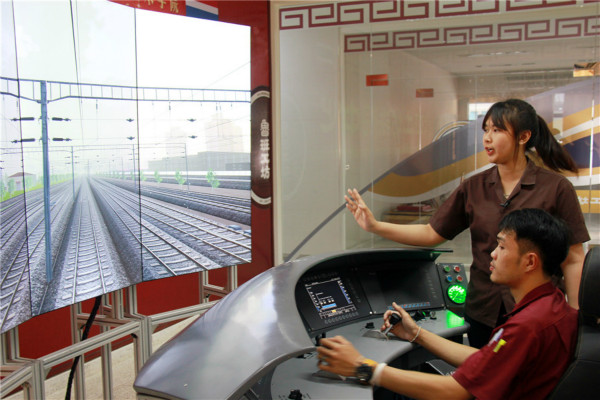
Students practice driving a high-speed train in a simulator at Phra Nakhon Si Ayutthaya Technical College in Ayutthaya, Thailand, in February. [Photo/Xinhua]
"Now the train moves forward," said 20-year-old Arthitaya Sapkum, who was attentively looking at a screen that simulates the locomotive window of a high-speed train, while her classmates were operating the control system on a panel.
The China-sponsored training platform for simulated driving, an eye-catching attraction for students and visitors, is on the second floor of the Lu Ban Workshop in Thailand.
The project, named for Lu Ban, a legendary Chinese carpenter from the 4th century BC, provides state-of-the-art technical and vocational training to serve various aspects of the Belt and Road Initiative. It was created by Tianjin municipality.
"Studying here is good. We can easily understand how a train system is structured and how trains work," said Arthitaya, who was on a short-term training program with her classmates from Thailand's Ko Kha Industrial and Community Education College.
She is one of the more than 2,000 students who received training at the workshop since March 2016 in Thailand. On the second floor of the workshop is the Tianjin Railway Technical and Vocational College Center, China's first overseas technical center for high-speed railway training. It is equipped with modern teaching equipment and long-distance learning facilities.
Since there is no high-speed rail in Thailand, all teaching materials and equipment at the center are provided by the Chinese side.
Broad subject matter
In the past three years, the workshop has helped Thai students learn about many high-tech fields, from new energy car development and the internet of things to high-speed trains. Tianjin also offers scholarships for study in China.
"To promote Belt and Road construction, the Lu Ban Workshop provides academic education and skills training for partners in other countries. It is a bridge connecting China's vocational education with that of the world," said Lyu Jingquan, deputy director of Tianjin Municipal Education Commission.
Jarun Youbrum, director of the Thai vocational school, is proud of the workshop, saying that courses can nurture talent for the future development of Thailand's high-speed rail system.
"We are the only one in Thailand, and I think we should be a good example of Thailand-China cooperation on education and the implementation of the Belt and Road Initiative in Thailand," Jarun said.
Arthitaya and Jarun are among those who have been building support for China-Thailand cooperation within the BRI framework.
The Thai government is committed to the progress of the Thai-Chinese high speed rail project and hopes it will be completed as soon as possible, Thai Prime Minister Prayut Chan-o-cha told Xinhua News Agency last week before attending the Second Belt and Road Forum for International Cooperation held in Beijing.
"As the Chinese proverb says, 'Unity makes everything a success', and we are pleased that the project has made good progress, and have taken the opportunity to learn more about high-speed railways and related technology," the prime minister said.
Closer ties
Since 2016, eight Lu Ban Workshops have been set up in Asia, Africa and Europe, and have trained more than 4,000 people in 17 majors covering mechanics, new energy, automobiles, communications and catering.
The program is not just a unilateral education provider, but involves two-way exchanges that help enhance ties and cultural links between China and other countries.
Two years ago, the Tianjin School of Commerce, sponsored by the Tianjin Food Group, set up a workshop in the United Kingdom's Chichester College and succeeded in incorporating its professional training standards into Britain's national vocational qualification framework.
Earlier this year, students from the workshop put their culinary skills to the test when catering to the British prime minister, Theresa May, and her guests on the last day of January at No 10 Downing Street, in London, where she was hosting a Chinese New Year reception.
Steamed vegetable dumplings, crispy duck, eight types of canapes and other dishes impressed some 150 guests.
"Many Chinese guests at the event said they hadn't had such authentic dishes for years," said Wu Zhengxi, who teaches culinary skills at the school in Tianjin and represented Chinese chefs at the reception. "I proudly told them we're with the Lu Ban Workshop." "The future for Chinese cuisine in the UK just got a whole lot brighter," said celebrity chef Ching He Huang.



